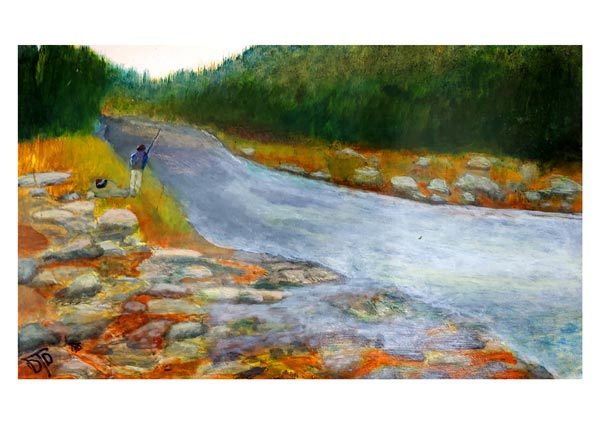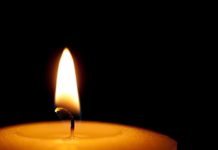“The Outsider Art of Donald T. Dunphy” was released in December 2020. The Middletown based artist passed away in October 2019 at the age of 82. He had never expressed an interest in artistic expression until his late 70s after his wife had passed away and he picked up the paints she once used. What happened next was a lesson in how art can heal and people can grow. It’s a book of artwork compiled by his son in the months that followed to let his father’s work and his story be known.
The book is available for sale in hardcover form at amazon.com and a Facebook page has been set up with images and information about the book.
New Jersey Stage reached out to his son, Dw. Dunphy (a musician, writer, and artist in his own right) to learn more about the project.
The book is entitled, “The Outsider Art of Donald T. Dunphy.” What made him an outsider?
The term “outsider artists” generally describes people who never sought training for art, or even thought of what they made as art. In a lot of cases, we’re talking about people who were attempting some form of decoration. They weren’t trying to make capital “A” art, but were just trying to make something that looked good to themselves. There are other terms for it. I think “art brut” fits in as well, as might forms of folk art.
Tell me about your father. He was a repairman, right?
Yes, for many years he was a television repairman, back when you could still repair these things. He worked on vacuums, video recorders, those sorts of things. Prior to that, in the early 1960s, he and his brothers tried to run a diner in Middletown. Dad was always a good cook, even long after his electronics repair years. I think what Dad really wanted was to be a business owner, a business operator. He came up in Long Branch as a post-Depression kid, so there was a cache in being “a boss,” the guy who ran things as opposed to being the guy who worked for the boss.

Your father took up painting after your mother passed away. Were you surprised that he began painting?
I think the entire family was surprised. My family has always been into creative outlets like writing, art, and music, but those came from my mother. Dad was always about learning a trade and having a concrete skill as your way in the world. He never drew, and never indicated he had an interest in it.
But taking up my mom’s paints was a way to be close to her. In 2000, from February to June, we had a hospital bed brought into the house. Mom was in hospice for multiple forms of cancer. Dad also had a “geri” chair brought in, and he stayed in that chair next to the hospital bed throughout the entire time. After her passing, his feet swelled with fluid three times their normal size because the chair was terrible for circulation. I mention this only to reinforce how devoted he was during that period.
So you can imagine that level of devotion doesn’t merely go away. Taking up her paints was a form or art therapy, I imagine before that term was actually fashionable. And some of those first efforts were rough, but he stuck with it. It was weird to see it. Dad’s handwriting all his life was incredibly sloppy, almost illegible, but here he was painting landscapes that were immediately recognizable by anyone who saw them, and he was growing in his abilities.
In your father’s obituary it says that painting kept his wife in his thoughts and finally fulfilled his own longtime dream. Was his dream to become an artist? If so, were you and your family aware of that dream?
It wasn’t his longtime dream to paint, but it was a dream of his to be free to express himself. Again going back to Long Branch as a kid, you didn’t express yourself in any way. That was a sure way of marking yourself for victimization, so you always had to play the role of the tough guy. You don’t mess with the tough guy, or his home, or his family because you suspected he’d come after you if you did. It was a necessary defense mechanism.
Painting ultimately allowed him to express something that he probably wanted to verbalize his whole life long but felt was too risky.

The paintings I’ve seen were all of landscapes. Did he paint anything else or prefer to work in landscapes?
He did a few portrait paintings, but faces are unforgiving. It is not a pleasurable experience to paint a face, especially the face of a person you know, because you put so much pressure on yourself to be realistic, and if you don’t achieve the results you think you need to get, that’s a lot of stress. Painting was his way to destress and unburden himself, so in all, he didn’t want to turn that into a pursuit that caused more dread than peace.
Did your father ever show his work in an exhibition? If not, do you think he would have liked to?
You know, even with his tough guy ways, Dad was self-conscious. Me and my family would gush sincerely about his progress and how good the images were coming along, but I think he always felt like those are the things you say because you have to.
Honestly, I feel guilty that I didn’t push harder while he was alive. I wish I had attempted to get his work out into the public so that maybe the response could come back to him while he was here to appreciate it. I didn’t push it because I felt I was respecting his wishes, but being able to see it all in hindsight’s totality, I don’t think he would have minded. So yeah, there is a burden that will always be on me that I didn’t get the spotlight to shine on him while he could be in it, but I cannot allow his story to go unsaid now.
That’s kind of what every child wants for their family members, right? That they don’t get lost in the world when they’re gone and they’re just a null Social Security number and a headstone somewhere. You want them to have an “afterlife.” I want to one day have someone ask, “Was your dad Donald T. Dunphy?” I’m not harboring illusions that such might ever happen, but it’s what a kid wants for their parents, that the world hasn’t erased them.

Finally, what would you like the world to know about your father and his art?
Primarily, that he wasn’t a painter until he was. He never showed inclinations of wanting to be a painter until he did. People beat themselves up because there are things they want to do in this life but they don’t bother because “God didn’t give me that gift,” or “It’s not in the cards for me,” and on and on. For the more religious-oriented, I think it isn’t that God gives you gifts, but that you get the passion for something that you pursue. The passion might be the gift, but the pursuit is on you.
I can show someone a painting of a man fly-fishing along an autumn stream and then tell that person the picture was done by someone who, prior to 2000, never painted…ever had the desire to paint. Dad did not have a God-given gift, but the urge was brought to him and he stuck with that. Now I have his body of work to prove to others that this is true, and maybe I can give him the recognition he deserves.
Gary Wien has been covering the arts since 2001 and has had work published with Jersey Arts, Elmore Magazine, Princeton Magazine, Backstreets and other publications. He is a three-time winner of the Asbury Music Award for Top Music Journalist and the author of Beyond the Palace (the first book on the history of rock and roll in Asbury Park) and Are You Listening? The Top 100 Albums of 2001-2010 by New Jersey Artists. In addition, he runs New Jersey Stage and the online radio station The Penguin Rocks. He can be contacted at gary@newjerseystage.com.
Credit: Source link































